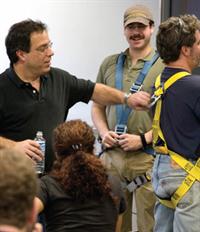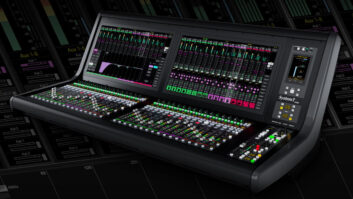

The Rigger Is a Pro
The Entertainment Technician Certification Program Council is made up of individuals and organizations representing the AV, communications, theater, concert, and film industries. After five years of development, a rigging certification program was offered in the fall of 2005.
IT WASN’T LONG AGO I COULD SHOW UP FOR a job, hang whatever it was I was supposed to hang and go home without anyone asking, “Do you know what you’re doing?” or “How do we know it’s safe?” or the time-honored “Will that stay up there?”
I was glad no one asked because I didn’t have any answers. I had no training in rigging, and I didn’t have any letters after my name. Even if I wanted credentials, there was no place to get them.
But as productions started getting bigger and rigging systems more complex, people began to realize the industry could be headed for a disaster. Rigging equipment, as well as lighting and sound systems, were being installed in venues around the country by people who may or may not have known what they were doing.
Bill Sapsis, left, teaches riggers about on-the-job safety. His company employs several pros accredited by the Entertainment Technician Certification Program.
Enter the Entertainment Technician Certification Program (ETCP). The ETCP Council is made up of individuals and organizations representing the AV, communications, theater, concert, and film industries. After five years of development, a rigging certification program was offered in the fall of 2005. The following year, electrical certification joined the rigging program. Today they’re the only voluntary certification programs for riggers and electricians in the North American entertainment business.
Industry experts, under the guidance of a certification administration company, developed the test. There are two rigging tests, one for theatrical applications and one for arena-style venues, plus one test for electricians. The tests are not for beginners: All three were designed to identify the skills of riggers and electricians that have a considerable amount of work experience under their belts.
The impetus was and remains safety. With all that equipment hanging overhead, and with computers taking over control of most of that gear, it’s imperative people who know what they’re doing be involved with installation and operation.
What’s more, I’m seeing more and more bid specifications for new construction and renovations that require a certified rigger. This means stage rigging and lighting of course, but it also encompasses sound and projection. Speakers need hanging, and who better to make sure those speakers stay overhead than someone who is certified?
The same goes for projection equipment. Projectors and screens are sometimes treated as an afterthought, particularly when it comes to choosing a suspension system. From my experience, this equipment is often hung from ceiling joists with whatever is handy. But just because a projector only weighs 150 pounds doesn’t mean it won’t do some serious damage when it falls 25 feet to the floor.
The Entertainment Technician Certification Program
The Entertainment Technician Certification Program was launched in 2005 and designed to create independent assessments, conduct examinations, and award credentials to entertainment technicians in rental and staging. Under the umbrella of the Entertainment Services and Technology Association (ESTA), ETCP was formed by InfoComm International, the Alliance of Motion Picture and Television Producers, the International Alliance of Theatrical Stage Employees, the International Association of Assembly Managers, and many others.
Architects, engineers, and consultants understand this and, as they become more aware of the certification programs, they will write certified supervisor requirements into their requests. Many venues, convention centers, and arenas also see the merits of the program (MGM Mirage and Cirque du Soleil recently joined). By requiring lead riggers to be certified, they lower the chance of an accident and satisfy some of their due diligence requirements.
Let’s face it, there’s a certain amount CYA involved here, but that’s OK. The end result is still a safer work environment. Whether you have riggers, electricians, AV technicians, or sound engineers, consider getting on-board with the appropriate certifications.
Bill Sapsis owns Sapsis Rigging in Lansdowne, Pa. The company has four full-time and three part-time ETCP Certified Technicians on staff. For more information, visit etcp.etsa.org.










